Elites. He wasn't the first president to hate the "striped pants boys," the tea-drinking, Ivy-league, East-coast pantywaists who ran D.C. and Wall Street and Madison Avenue. But he was the first who took that chip from his shoulder and turned it into a means of connecting with people. Nixon's father owned a store. His parents were too poor to send him to Harvard or Yale so he went to local Whittier College instead. He got a scholarship to Duke Law School but then couldn't get a job in an elite East Coast law firm. He never got over his petulance at feeling like an outsider. So he used it. He forged a new strategy for the right: mirroring the electorate's grievance back at them and telling them grievance was guts.
The press. Reporters were never to be trusted. "They're the enemy," he told his aides. "The press is the enemy." The press used innuendo, misrepresentation, and character assassination--all tactics he used on his own enemies--against poor Dick Nixon. They whipped up controversy over his expenses, his donors, his lies, his father's death, for god's sake, insisting on seeing the dying man on his death bed to confirm he was actually dying. That's how little they trusted Tricky Dick. They lapped up everything someone like JFK said but they snorted at Nixon's cornball stories, his maudlin tales of youthful deprivation. They mercilessly dug up his secrets. They weren't even nice enough in covering his daughter's wedding.
Jews. His antisemitism, revealed in the White House tapes, was appallingly undisguised. "There's a Jewish cabal, you know," he told his chief of staff. It was just another group that he resented because he thought they had something he ought to have.
Alger Hiss. House Member Nixon rode the prosecution of Hiss to national fame and a Senate seat because Hiss was a Communist and a spy, but deep down he hated the man because he was a product of the privilege and education that Nixon himself coveted.
Dwight D. Eisenhower. Ike chose Dick as his V.P., but the two men never warmed to each other. Nixon resented how Dwight used his V.P. pick as an attack dog while he himself rose above the fray. (For his own part, Eisenhower grumbled that Dick Nixon wasn't grown up. But he would never grow up.) And when the press went after Nixon for a political slush fund, Ike let his number two swing, forcing Nixon to go on television and expose his entire, pitiful financial situation to the nation. Tricky Dick turned the "Checkers speech" into a political triumph, but he never forgave Ike for it.
Checkers. The dog famously provided the climax of Nixon's televised humiliation, when he admitted that the cocker spaniel was a gift but his daughters loved their pet, so he would not give Checkers back. He posed with the dog in photos. But in truth, Nixon never liked dogs.
John F. Kennedy. Originally, they were friends. JFK donated to Nixon's first House campaign. But Jack was so rich, so good-looking, so well-educated, so loved, that it was inevitable he would end up hated. Besides, JFK got away with things that Nixon got called out for: lying, smearing rivals, spying on the opposition. When Kennedy beat Nixon in the 1960 presidential election by 100,000 votes, Nixon insisted the election was stolen. But he decided that being a sore loser would subject the nation to uncertainty and acrimony, so for once, he chose the high ground.
African Americans. His stance on civil rights during the Eisenhower administration was principled, but black voters abandoned him in 1960, so to hell with them. His "southern strategy" thereafter used the racist dog-whistle of "law and order" to appeal to aggrieved white working class voters who, in their hearts, equated "black person" with "criminal." He had realized something key about politics: it wasn't about who people liked, but who they hated.
Ronald Reagan. The handsome and popular governor of California ran against Nixon from the right in the 1968 primary, ginning up a Southern rebellion against Nixon's moderate stance on civil rights. But the real reason to hate Reagan was that he had the quality Nixon lacked: the ability to make people love him.
Everett Hart. Dick sometimes lashed out physically at aides. After a telethon, he hit Everett Hart, right on the spot where surgeons had removed a rib for heart surgery. Hart, unlike other aides, quit the campaign.
"Far-right kooks." The far-right kooks were just as bad as "the nuts on the left," Nixon told an aide. But they rang doorbells and blew up balloons. And on election day "they turn out to vote." He despised them, but catered to their kookiness.
America. At least, he hated the country he feared America was becoming, the "cities enveloped in smoke and flame," the "Americans hating each other"--the whole scene of American carnage he described in his acceptance speech at the Republican convention. It was the America of the anti-war demonstrators, the professors, the urban population, the minorities--everyone who wasn't the good, God-fearing, implicitly white "Silent Majority" that Nixon saw as his base.
Vietnam. Naturally he hated the North Vietnamese--enough to drop three times as many explosives on them as were used in all of World War II. But it was the South Vietnamese inability to defend themselves that kept him mired in this war. By his second term, his strategy was no longer to preserve democracy in South Vietnam. It was to get out and make sure the South Vietnamese were blamed instead of America when their country fell to the Communists.
J. Edgar Hoover. Once a great fighter, Hoover had grown cautious. When Nixon wanted to use wiretapping, mail spying, and break-ins to keep tabs on anti-war protestors, Hoover objected. So Nixon hired his own lackeys to do it.
Daniel Ellsberg. The defense analyst's leaking of The Pentagon Papers could have been used, by a president with more self-control, as an asset. The 47-volume report tracing the history of screw-ups, failures, and lies about Vietnam illustrated just how little the war was about helping the South Vietnamese. Henry Kissinger thought it was a gold mine: "It pins it all on Kennedy and Johnson," he told Nixon. But Dick saw it as part of a "conspiracy" to bring him down. If the leakers had The Pentagon Papers, what else might they reveal? His secret bombing of Cambodia? The upcoming mining of Hanoi Harbor? He used his tried and true tactics: his lackeys broke into Ellsberg's psychiatrist's office, looking for dirt.
His vice president, Spiro Agnew. Spiro was an asset, because no one would want to see Nixon replaced by Agnew. Dick's joke nickname for his V.P. was "the assassin's dilemma." Then Agnew got wrapped up in an FBI inquiry into bribery and tax evasion, and resigned. Needing Congressional approval, Nixon appointed the bland Gerald Ford as his successor.
The Brookings Institution. The liberal think tank reportedly had a trove of documents, some dealing with LBJ's halting of bombing in 1968. They might reveal that Nixon had secretly messaged the South Vietnamese that a Nixon administration would get them a better deal than LBJ, scotching Johnson's attempts to make peace. Ordered by the president to get whatever Brookings had, his lackeys planned to start a fire there and ransack the place until saner heads prevailed.
Communists. Just joking. Actually, he didn't hate Communists. "I respect them," he told his aides. "I have utter contempt for the so-called intellectuals who put themselves on a high moral plane and are just weak." Communists weren't weak. Mae Zedong even showed Nixon a rare respect, claiming that "Only Nixon . . . can solve the problems we are now facing." And indeed, Nixon's visit to China was highly productive, improving relations between the two nations. And this brought the Soviets to the table to make an anti-ballistic-missile deal. But his foreign policy successes were soon overshadowed.
Special prosecutor Archibald Cox. The prosecutor appointed to investigate the Watergate break-in was simply acting out a "partisan political vendetta." So, Nixon told attorney general Elliot Richardson to fire him.
Attorney general Elliot Richardson. Richardson refused and resigned instead. The job fell to deputy attorney general William Ruckelshaus.
Deputy attorney general William Ruckelshaus. He also resigned rather than fire the special prosecutor. The job was then inherited by Solicitor General Robert Bork, who, presumably agreed with the Nixon claim: "When the president does it, that means that it is not illegal."
Supreme Court Chief Justice Warren Burger. He wrote the unanimous decision forcing Nixon to hand over the White House tapes proving that he had ordered the cover-up of the Watergate break-ins. At that point, it was all over but the helicopter ride into disgrace. He told his aides: "Always remember, others may hate you--but those who hate you don't win unless you hate them, and then you destroy yourself."
The co-op board at 19 East 72nd Street in New York. After four years of political exile in California, the Nixons, wanting to be nearer their grandchildren, put down a deposit on a penthouse. But after shareholders revolted, the board rejected them. They bought a townhouse instead.
Arthur Schlesinger Jr.'s son Robert. The Nixon's townhouse backyard abutted that of the historian and Kennedy special assistant, Arthur Schlesinger. Schlesinger's son Robert went trick-or-treating at the Nixon home in what was for many years a best-seller: a Nixon mask.
Pat Nixon. Of course he loved his wife. But he ignored her so assiduously it alarmed his aides, and reports of their violent quarrels sometimes made it past the "gentleman's agreement" that kept such things from being discussed. She had never really warmed to his career. She never understood that politics was his life.
Himself. His father beat him. He spanked him, whipped him with a strap, hit him with belts and rulers. The boy knew his father's uncontrolled temper was to blame. But in some deep part of him, he knew there was something unlovable about himself. His older brother was charming; his younger brother was handsome. Dick Nixon was neither. A little voice in his head was always there. It said: your father never loved you; why should you?

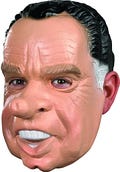
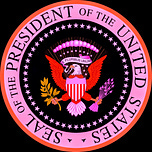



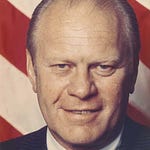

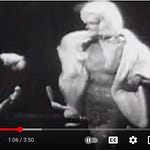
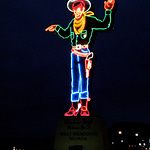
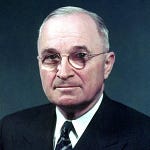
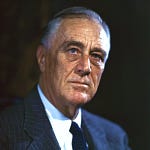
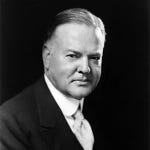
37: Richard Nixon